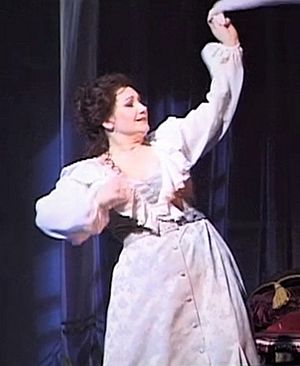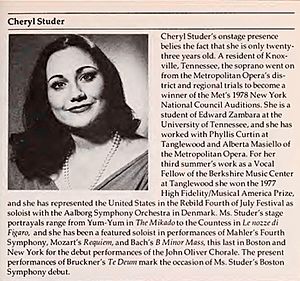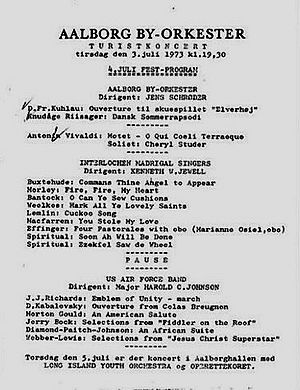Cheryl Studer facts for kids

Cheryl Studer (born October 24, 1955) is a famous American opera singer. She is known for her powerful and beautiful high-pitched voice, called a dramatic soprano. She has performed in the world's most important opera houses and has sung over 80 different roles.
Studer is especially famous for her performances of operas by German composers Richard Strauss and Richard Wagner. Over her long career, she has also sung roles for other voice types, including lyric soprano, coloratura soprano, and even the lower mezzo-soprano.
Contents
A Singer's Journey Begins
Cheryl Studer was born in Midland, Michigan. As a child, she learned to play the piano and viola. She discovered her love for singing and began taking voice lessons when she was 12 years old.
She attended the Interlochen Arts Academy, a special school for young artists. After high school, she studied music at the University of Tennessee and earned her degree in 1979. During her school years, Studer won several awards, including the important Metropolitan Opera National Council Auditions in 1978.
After graduating, Studer traveled to Austria to study German art songs, known as Lied. One of her teachers, the famous singer Hans Hotter, convinced her to stay in Europe to continue her training. This decision helped launch her international career.
A Star on the Opera Stage

Studer's professional career took off in Germany. In 1981, she joined the Bavarian State Opera in Munich. At first, she sang smaller parts, but she soon began performing lead roles. It was here that she started to focus on the powerful music of Richard Wagner.
Rise to Fame in the 1980s
In 1985, Studer had a major breakthrough. She performed the role of Elisabeth in Wagner's opera Tannhäuser at the famous Bayreuth Festival. This performance received great reviews and made her a star.
Soon, she was invited to sing at the world's top opera houses:
- 1986: She sang at the Liceu in Barcelona, the Opéra de Paris, and the San Francisco Opera.
- 1987: She made her first appearance at the Royal Opera House in London and at La Scala in Milan, Italy.
- 1988: She debuted at the Metropolitan Opera in New York City as Micaëla in the opera Carmen.
- 1989: She sang at the Vienna State Opera and the Salzburg Festival for the first time.
A Busy Career in the 1990s
Throughout the 1990s, Studer was one of the busiest and most sought-after sopranos in the world. She returned to the Metropolitan Opera many times to sing roles in operas by Mozart and Verdi. She also performed leading roles at La Scala and the Vienna State Opera.
Some of her famous roles during this time included:
- Elsa in Wagner's Lohengrin
- The Countess in Mozart's The Marriage of Figaro
- The title role in Verdi's Aida
- The Marschallin in Richard Strauss's Der Rosenkavalier
In the late 1990s, she experienced some vocal challenges but soon returned to the stage, continuing to perform at a high level.
Performances in the 21st Century
In 2000, Studer returned to the Metropolitan Opera to sing the Marschallin in Der Rosenkavalier. She continued to perform major roles in operas by Richard Strauss, such as the Empress in Die Frau ohne Schatten and the title role in Arabella.
In 2005, she was part of a historic event, singing in the first-ever performance of Wagner's complete Ring Cycle in China.
Sharing Her Knowledge
In recent years, Studer has started to sing roles for lower voice types, like the mezzo-soprano. She has also become a respected teacher. From 2003 to 2021, she was a professor at the University of Music in Würzburg, Germany.
She gives special lessons called master classes to young singers around the world, in countries like the United States, Greece, South Korea, and China. In 2010, she also tried something new: directing an opera for the first time.
Personal Life
Cheryl Studer has lived in Germany for most of her adult life. She is married to Greek tenor Michalis Doukakis. She has two daughters from previous marriages, named Elsa and Senta. Both names come from characters in operas by Richard Wagner.
Famous Roles
Cheryl Studer has performed in dozens of operas. Here are some of her most well-known roles:
- Leonore in Fidelio by Beethoven
- Micaëla in Carmen by Bizet
- Lucia in Lucia di Lammermoor by Donizetti
- Donna Anna in Don Giovanni by Mozart
- Pamina and the Queen of the Night in The Magic Flute by Mozart
- Rosalinde in Die Fledermaus by Johann Strauss II
- Salome, Arabella, and the Marschallin in operas by Richard Strauss
- Violetta in La traviata by Verdi
- Aida in Aida by Verdi
- Senta, Elisabeth, Elsa, and Sieglinde in operas by Richard Wagner
See also
 In Spanish: Cheryl Studer para niños
In Spanish: Cheryl Studer para niños
 | Claudette Colvin |
 | Myrlie Evers-Williams |
 | Alberta Odell Jones |


